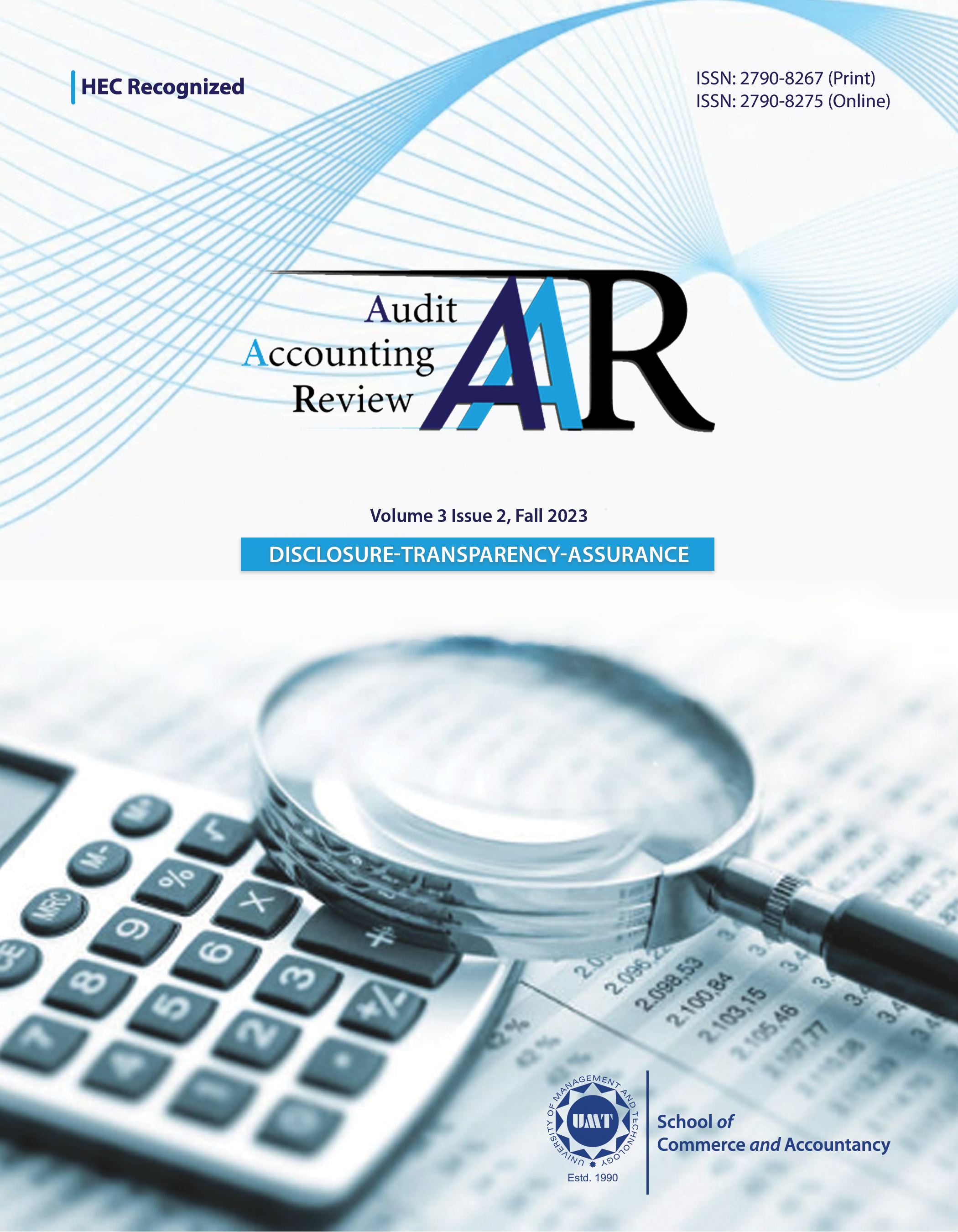Boardroom Alchemy: Unravelling the Debt and Agency Costs in Manufacturing Sector of Pakistan
Abstract
 Abstract Views: 0
Abstract Views: 0
The current study aims to investigate boardroom diversity and its varying characteristics by using agency theory to examine the effect of debt and agency costs in the manufacturing sector of Pakistan. Precisely, it seeks to examine how board size, independence, and gender diversity affect the financial matrices of a firm’s profitability. Therefore, the study utilized an imbalanced panel of 105 manufacturing companies that were listed on the Pakistan Stock Exchange (PSX) 2003 to 2022. Furthermore, the study utilized static and dynamic panel models to examine and evaluate the proposed hypotheses. The findings of this study indicated that there is a positive relationship between board size, gender diversity, and debt and agency costs for manufacturing enterprises in Pakistan. Conversely, it was observed that board independence has a negative impact on the debt and agency costs of firms. Future research can use experimental or longitudinal approaches, including varied businesses, to investigate qualitative research for deeper insights. Cross-cultural comparisons would support the findings. Consequently, this study highlighted the importance of exercising caution when evaluating the influence of board composition on debt and agency costs. The results of the study also prompted inquiries regarding the financial ramifications of initiatives aimed at promoting gender diversity.
Downloads
References
Ahmad, N., Mobarek, A., & Roni, N. N. (2021). Revisiting the impact of ESG on financial performance of FTSE350 UK firms: Static and dynamic panel data analysis. Cogent Business & Management, 8(1), Article e1900500. https://doi.org/10.1080/23311975.2021.1900500
Aksoy, M., & Yilmaz, M. K. (2023). Does board diversity affect the cost of debt financing? Empirical evidence from Turkey. Gender in Management: An International Journal, 38(4), 504–524. https://doi.org/10.1108/GM-01-2022-0021
Bacha, S., Ajina, A., & Saad, S. B. (2021). CSR performance and the cost of debt: Does audit quality matter? Corporate Governance: The International Journal of Business in Society, 21(1), 137–158. https://doi.org/10.1108/CG-11-2019-0335
Baltagi, B. H., Bresson, G., & Pirotte, A. (2008). To pool or not to pool? In L. Mátyás & P. Sevestre (Eds.), The econometrics of panel data: Fundamentals and recent developments in theory and practice (pp. 517–546). Springer Berlin Heidelberg. https://doi.org/10.1007/978-3-540-75892-1_16
Bathala, C. T., & Rao, R. P. (1995). The determinants of board composition: An agency theory perspective. Managerial and Decision Economics, 16(1), 59–69. https://doi.org/https://doi.org/10.1002/mde.4090160108
Beji, R., Yousfi, O., Loukil, N., & Omri, A. (2021). Board diversity and corporate social responsibility: Empirical evidence from France. Journal of Business Ethics, 173(1), 133–155. https://doi.org/10.1007/s10551-020-04522-4
Blundell, R., & Bond, S. (1998). Initial conditions and moment restrictions in dynamic panel data models. Journal of Econometrics, 87(1), 115–143. https://doi.org/https://doi.org/10.1016/S0304-4076(98)00009-8
Bonazzi, L., & Islam, S. M. N. (2007). Agency theory and corporate governance. Journal of Modelling in Management, 2(1), 7–23. https://doi.org/10.1108/17465660710733022
Brockman, P., & Unlu, E. (2009). Dividend policy, creditor rights, and the agency costs of debt. Journal of Financial Economics, 92(2), 276–299. https://doi.org/https://doi.org/10.1016/j.jfineco.2008.03.007
Brüggen, E. C., Hogreve, J., Holmlund, M., Kabadayi, S., & Löfgren, M. (2017). Financial well-being: A conceptualization and research agenda. Journal of Business Research, 79, 228–237. https://doi.org/https://doi.org/10.1016/j.jbusres.2017.03.013
Bun, M. J. G., & Sarafidis, V. (2015). Dynamic panel data models. In B. H. Baltagi (Ed.), The Oxford Handbook of Panel Data (pp. 76–110). Oxford University Press. https://doi.org/10.1093/oxfordhb/9780199940042.013.0003
Canarella, G., & Miller, S. M. (2022). Firm size, corporate debt, R&D activity, and agency costs: Exploring dynamic and non-linear effects. The Journal of Economic Asymmetries, 25, Article e00233. https://doi.org/https://doi.org/10.1016/j.jeca.2021.e00233
Chaudhary, P. (2022). Agency costs, board structure and institutional investors: Case of India. Asian Journal of Accounting Research, 7(1), 44–58. https://doi.org/10.1108/AJAR-12-2020-0130
Chen, G., Chen, X., & Wan, P. (2022). Naive independent directors, corporate governance and firm performance. Frontiers in Psychology, 13, Article e984661. https://doi.org/10.3389/fpsyg.2022.984661
Chen, L., Gao, F., Guo, T., & Huang, X. (2023). Mixed ownership reform and the short-term debt for long-term investment of non-state-owned enterprises: Evidence from China. International Review of Financial Analysis, 90, Article e102861. https://doi.org/https://doi.org/10.1016/j.irfa.2023.102861
Samuel, S. D., Mahenthiran, S., & Ramasamy, R. (2022). CSR disclosures, CSR awards and corporate governance as determinants of the cost of debt: Evidence from Malaysia. International Journal of Financial Studies, 10(4), Article e87. https://doi.org/10.3390/ijfs10040087
Dirzka, C., & Acciaro, M. (2021). Principal-agent problems in decarbonizing container shipping: A panel data analysis. Transportation Research Part D: Transport and Environment, 98, Article e102948. https://doi.org/https://doi.org/10.1016/j.trd.2021.102948
Gaio, C., & Gonçalves, T. C. (2022). Gender diversity on the board and firms' corporate social responsibility. International Journal of Financial Studies, 10(1), Article e15. https://doi.org/10.3390/ijfs10010015
Gao, H., Wang, J., Wang, Y., Wu, C., & Dong, X. (2020). Media coverage and the cost of debt. Journal of Financial and Quantitative Analysis, 55(2), 429–471. https://doi.org/10.1017/S0022109019000024
Hill, C. W. L., & Jones, T. M. (1992). Stakeholder-Agency Theory. Journal of Management Studies, 29(2), 131–154. https://doi.org/https://doi.org/10.1111/j.1467-6486.1992.tb00657.x
Hsiao, C. (2007). Panel data analysis: Advantages and challenges. TEST, 16(1), 1–22. https://doi.org/10.1007/s11749-007-0046-x
Huynh, K., Wilden, R., & Gudergan, S. (2022). The interface of the top management team and the board: A dynamic managerial capabilities perspective. Long Range Planning, 55(3), Article e102194. https://doi.org/https://doi.org/10.1016/j.lrp.2022.102194
Kim, J., Shon, J., & McDonald, B. D. (2022). Does school district board type affect fiscal conditions? Examining debt positions. Public Performance & Management Review, 45(1), 30–53. https://doi.org/10.1080/15309576.2021.1939738
Kovermann, J., & Velte, P. (2019). The impact of corporate governance on corporate tax avoidance: A literature review. Journal of International Accounting, Auditing and Taxation, 36, Article e100270. https://doi.org/https://doi.org/10.1016/j.intaccaudtax.2019.100270
Luciano, M. M., Nahrgang, J. D., & Shropshire, C. (2020). Strategic leadership systems: Viewing top management teams and boards of directors from a multiteam systems perspective. Academy of Management Review, 45(3), 675–701. https://doi.org/10.5465/amr.2017.0485
Murray, A., Kuban, S., Josefy, M., & Anderson, J. (2019). Contracting in the smart era: The implications of blockchain and decentralized autonomous organizations for contracting and corporate governance. Academy of Management Perspectives, 35(4), 622–641. https://doi.org/10.5465/amp.2018.0066
Pandey, R., Biswas, P. K., Ali, M. J., & Mansi, M. (2020). Female directors on the board and cost of debt: Evidence from Australia. Accounting & Finance, 60(4), 4031–4060. https://doi.org/https://doi.org/10.1111/acfi.12521
Pekovic, S., & Vogt, S. (2021). The fit between corporate social responsibility and corporate governance: The impact on a firm’s financial performance. Review of Managerial Science, 15(4), 1095–1125. https://doi.org/10.1007/s11846-020-00389-x
Peng, X., Yang, Z., Shao, J., & Li, X. (2021). Board diversity and corporate social responsibility disclosure of multinational corporations. Applied Economics, 53(42), 4884–4898. https://doi.org/10.1080/00036846.2021.1910620
Plümper, T., & Troeger, V. E. (2007). Efficient estimation of time-invariant and rarely changing variables in finite sample panel analyses with unit fixed effects. Political Analysis, 15(2), 124–139. https://doi.org/10.1093/pan/mpm002
Rixom, J. M., Jackson, M., & Rixom, B. A. (2023). Mandating diversity on the board of directors: Do investors feel that gender quotas result in tokenism or added value for firms? Journal of Business Ethics, 182(3), 679–697. https://doi.org/10.1007/s10551-021-05030-9
Roberts, J., McNulty, T., & Stiles, P. (2005). Beyond agency conceptions of the work of the non-executive director: Creating accountability in the boardroom. British Journal of Management, 16(s1), S5–S26. https://doi.org/https://doi.org/10.1111/j.1467-8551.2005.00444.x
Roodman, D. (2009). How to do Xtabond2: An introduction to difference and system GMM in Stata. The Stata Journal, 9(1), 86–136. https://doi.org/10.1177/1536867X0900900106
Roy, U., & Chakraborty, I. (2023). Market concentration, agency cost and firm performance: A case study on Indian corporate firms. Economic Change and Restructuring, 56(4), 2645–2693. https://doi.org/10.1007/s10644-023-09529-1
Semykina, A., & Wooldridge, J. M. (2010). Estimating panel data models in the presence of endogeneity and selection. Journal of Econometrics, 157(2), 375–380. https://doi.org/https://doi.org/10.1016/j.jeconom.2010.03.039
Shakil, M. H. (2021). Environmental, social and governance performance and financial risk: Moderating role of ESG controversies and board gender diversity. Resources Policy, 72, Article e102144. https://doi.org/https://doi.org/10.1016/j.resourpol.2021.102144
Suhadak, S., Kurniaty, K., Handayani, S. R., & Rahayu, S. M. (2019). Stock return and financial performance as moderation variable in influence of good corporate governance towards corporate value. Asian Journal of Accounting Research, 4(1), 18–34. https://doi.org/10.1108/AJAR-07-2018-0021
Trinh, V. Q., Aljughaiman, A. A., & Cao, N. D. (2020). Fetching better deals from creditors: Board busyness, agency relationships and the bank cost of debt. International Review of Financial Analysis, 69, Article e101472. https://doi.org/https://doi.org/10.1016/j.irfa.2020.101472
Velte, P. (2017). Does ESG performance have an impact on financial performance? Evidence from Germany. Journal of Global Responsibility, 8(2), 169–178. https://doi.org/10.1108/JGR-11-2016-0029
Windmeijer, F. (2005). A finite sample correction for the variance of linear efficient two-step GMM estimators. Journal of Econometrics, 126(1), 25–51. https://doi.org/https://doi.org/10.1016/j.jeconom.2004.02.005
Wooldridge, J. M. (2021). Two-way fixed effects, the two-way mundlak regression, and difference-in-differences estimators. SSRN.
Zhang, L., Zhang, Z., Jia, M., & Ren, Y. (2020). A tiger with wings: CEO–board surname ties and agency costs. Journal of Business Research, 118, 271–285. https://doi.org/https://doi.org/10.1016/j.jbusres.2020.06.026
Copyright (c) 2023 Zahid Bashir, Muhammad Aamir, Sabeeh Iqbal

This work is licensed under a Creative Commons Attribution 4.0 International License.
Authors retain copyright and grant the journal right of first publication with the work simultaneously licensed under a Creative Commons Attribution (CC-BY) 4.0 License that allows others to share the work with an acknowledgement of the work’s authorship and initial publication in this journal.







